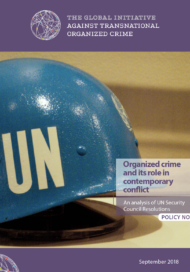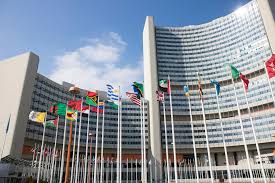Posted on 04 May 2021
This year’s session of the Commission on Narcotic Drugs (CND) was a low-key affair that focused on a growing consensus around health in the midst of the COVID-19 pandemic, but avoided difficult discussions or analysis of illicit drug economies.
The CND’s 64th session came only a month after the UN Crime Congress, and the CND had expended significant political energy on its December decision to reclassify cannabis. It is therefore unsurprising that this year’s meeting did not include any important new initiatives or stage any major debates – including around illicit drug markets or how to address them.
Although this year the meeting was held largely online, with Vienna caught in an ongoing COVID-19-induced lockdown and international travel still severely restricted, the CND staged a high-level session marking the anniversaries of the 1961 Single Convention on Narcotic Drugs and the 1971 Convention on Psychotropic Substances. The commemoration included supportive statements on the current international drug-control system from the UN Secretary-General and other senior figures.
Rhetorical commitments to the conventions remain strong and there is little to no appetite to have a meaningful debate about what a more modern drug-control framework might entail. But behind the rhetoric, questions remain about the role that the conventions play in drug policy at regional and national levels, which continue to test the fragile consensus underpinning the system.
Perspectives
During the opening debate, the continued tensions between the world inside the CND and realities in the outside world remained evident. For instance, the US intervention focused on the harms of synthetic drugs and the need for ‘a strong regulatory framework’ as ‘the most important piece’ to curb illicit supply, it ignored the growing regulated recreational cannabis markets in 16 states and Washington DC, and the decriminalization of certain psychedelics in states and cities in the US.
States also continued to exhibit a wide spectrum of views, showing how stretched the consensus has become. Pakistan, a strong supporter of the traditional drug-control regime, reiterated its call for a drug-free world, claiming it has a 90 per cent conviction rate for drug-related offences. Also representing the traditional enforcement-led approach, Singapore announced its candidacy to become a full member of the CND in 2024, brandishing its ‘robust enforcement’ credentials and referring to people who use drugs as ‘abusers’.
Conversely, there were continued calls for reform from other members. Jamaica, which became engaged in the CND after participating in the 2016 special session of the UN General Assembly, said it was time to ‘prioritize the review of the current drug-control architecture’. Mexico, whose legislature has voted to regulate recreational cannabis, called for reforms based on the evolution of illicit markets and the approaches that have not worked. New Zealand said it was time to ‘give ourselves the space to explore new approaches and innovative solutions to reduce harm and build up a body of evidence on what works’.
Although the usual fractures among states were visible, the resolutions, outlined below, hint that health responses are an area where governments, though with vastly divergent views on implementation, may be willing to continue to find common ground and cooperation.
Resolutions
Member states approved a resolution on the impact of the COVID-19 pandemic on countering drug issues, which doubles as a contribution to this year’s high-level political forum on sustainable development, which will be held in New York in July. The resolution was proposed by Russia and adopted by consensus without negotiation during the CND. It focuses on new trends and challenges posed by COVID-19, good practices and actions going forward on the ‘world drug problem’.
In the midst of the pandemic and lack of consensus on drug policy, the statement should be welcomed as a useful consensual document that has an uncharacteristically progressive emphasis on health responses, and does not exploit the public health crisis to stoke alarm and advance aggressive drug policies.
This is perhaps because the pandemic itself is foremost a health crisis, or because it has coincided with a unique global backlash against police violence in 2020 and 2021. It could also be geared towards the theme of the high-level political forum in New York, or perhaps these were the topics that were most likely to receive consensus among the membership.
Largely dedicated to health responses, the resolution highlights the need to innovate in approaches for substance abuse treatment, expand the coverage for prevention and treatment, and tackle lack of access to medicines, among others. On drug markets, the resolution notes that the pandemic has increased maritime trafficking and online sales of illicit substances, but does not offer a deeper analysis of the broader social and economic implications of the changes in modus operandi of drug traffickers. The resolution also leaves out some obvious areas of contention, such as decarceration related to the spread of COVID-19.
Four other resolutions were adopted during the CND, which also were predominantly focused on health and development. These were a resolution tabled by Canada on drug-demand reduction and treatment and an EU-tabled resolution covering prevention and recovery. Germany, Thailand and Peru tabled their annual resolution on alternative development, and Egypt tabled a resolution on the non-medical use of pharmaceuticals.
Way forward
Despite these resolutions, there was no substantive debate or analysis of the dynamics of drug-related organized crime. In the highly technical seizure and cultivation focused CND report on drug trafficking, there was a missed opportunity to facilitate a discussion around current drug markets, political and policy changes and future challenges.
For example, the report heavily features cannabis in Morocco, but with no reference to the recent law approving the cultivation, export and use of cannabis for medicine or industry. These issues were left to the side events (including those the Global Initiative Against Transnational Organized Crime engaged in). A useful next step for the CND would be to upgrade its discussions and analysis of the interplay between illicit markets, organized crime and affected communities.
While the CND remains the UN’s decision-making body on drug policy, its shift towards being an entity that responds to changes in global drug policy seems increasingly likely in the coming years. It votes every year on changes in the classification of substances under the conventions, and it will continue to establish guidelines for international cooperation that impact domestic policy implementation.
Yet, without strong consensus, the guidance has increasingly become a wide menu of options to choose from and is sometimes even ignored. If member states are willing to contemplate a new role for the CND, it could become a leading forum in hosting frank and meaningful discussions about the future of drug policy, including by sharing knowledge and analyzing the changing dynamics of illicit drug economies.



